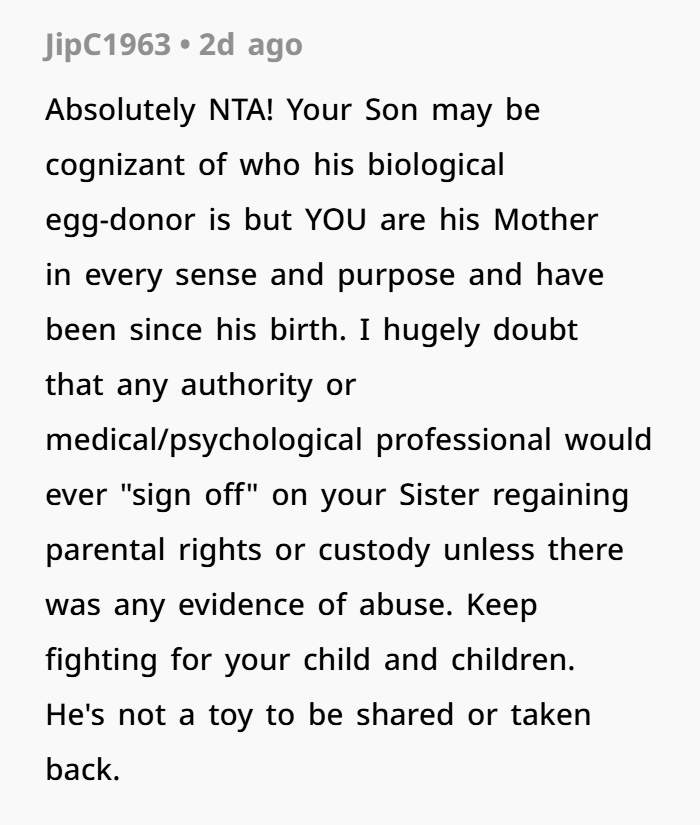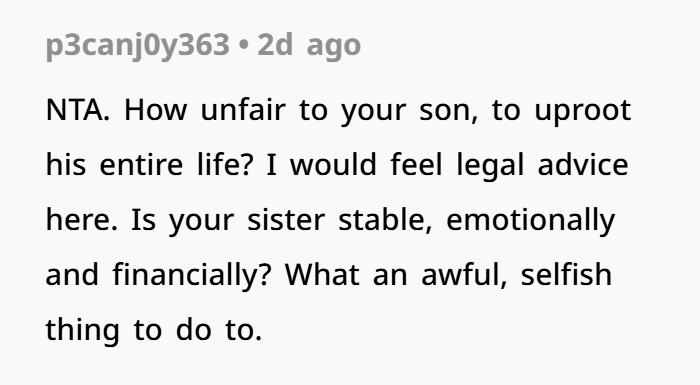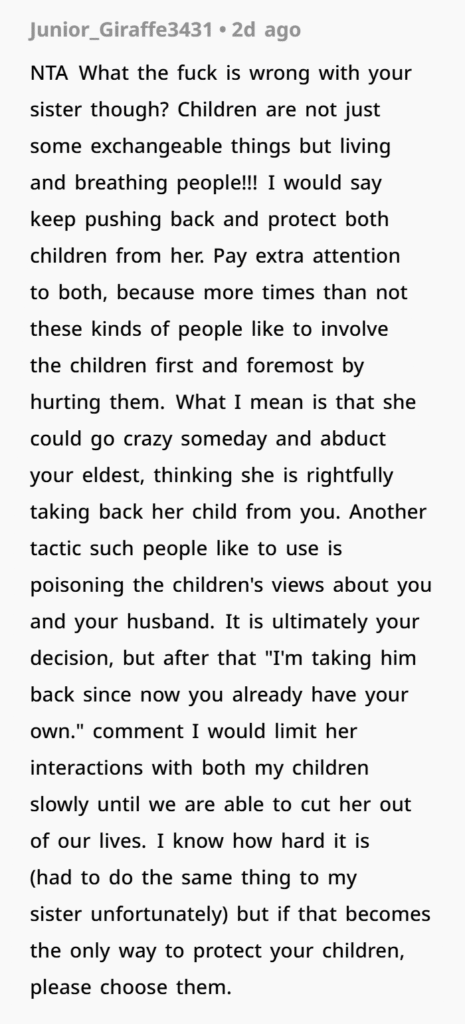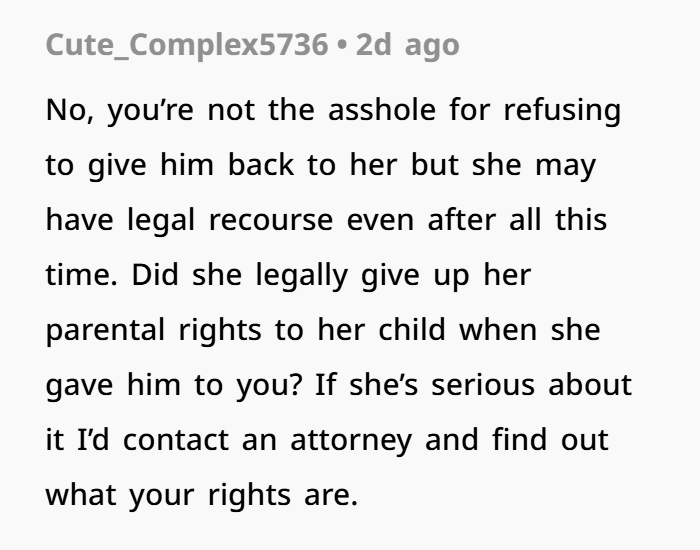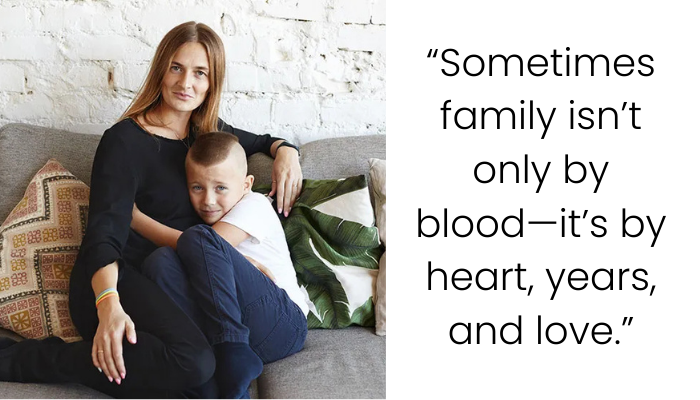AITA for refusing to return a child I’ve raised as my own?
You and your husband have raised your sister’s child from infancy: you paid for the hospital, you registered the child under your name, took the parental role, raised him as your own, always treated him as her legal children, and you even made a signed agreement. For many years you’ve provided love, stability, identity. You have another biological kid now, but the fostered/legally adopted child has always been accepted and loved as a son by you and your husband.
That’s everything a parent does: attachment, care, responsibility.
Now your sister wants to “take him back” because “you already have your own.” Which she believes gives her entitlement, despite the legal and emotional work you’ve already done. You feel that is unfair, unjust, and would harm the child. You’re wondering: are you wrong to fight to keep him?
A woman was raising her sister’s biological child for eight years
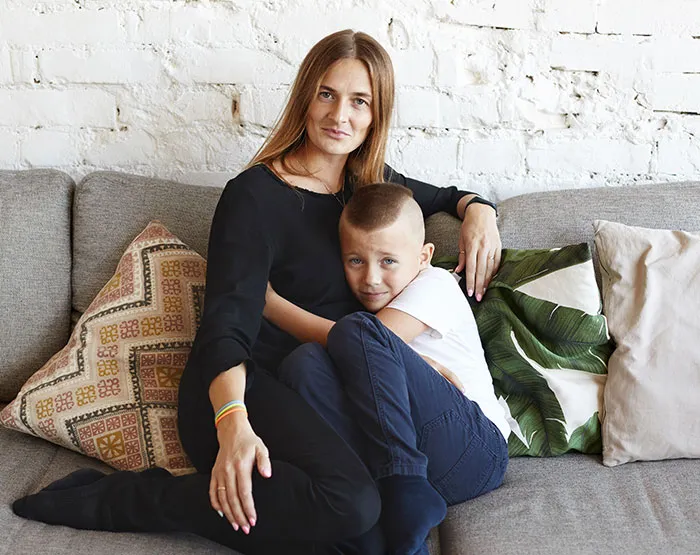
After she had her own daughter, the sister demanded that she give the son back, since she finally got a kid of her own
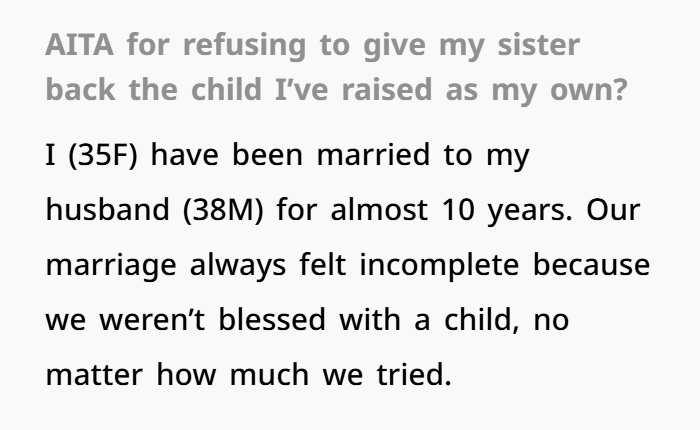
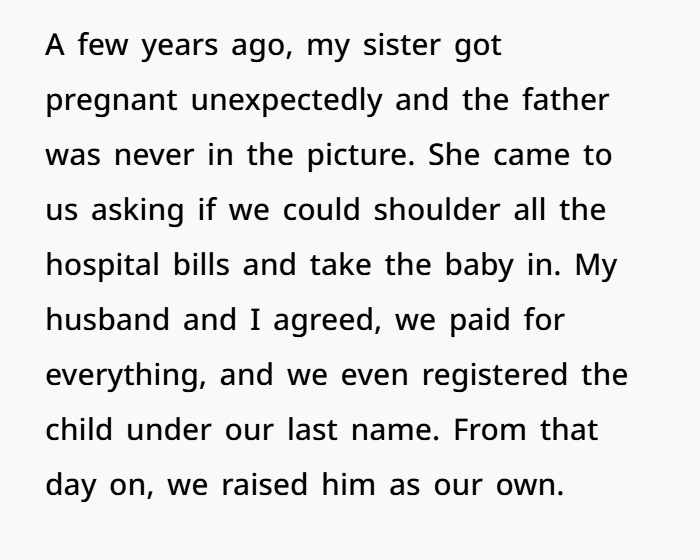

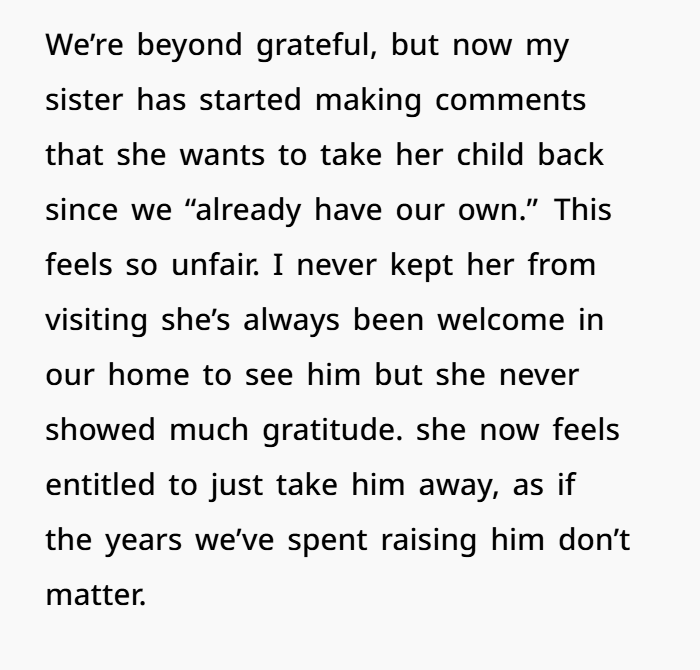
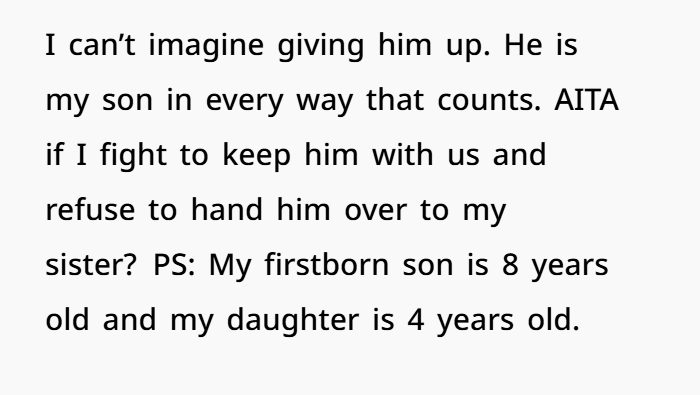
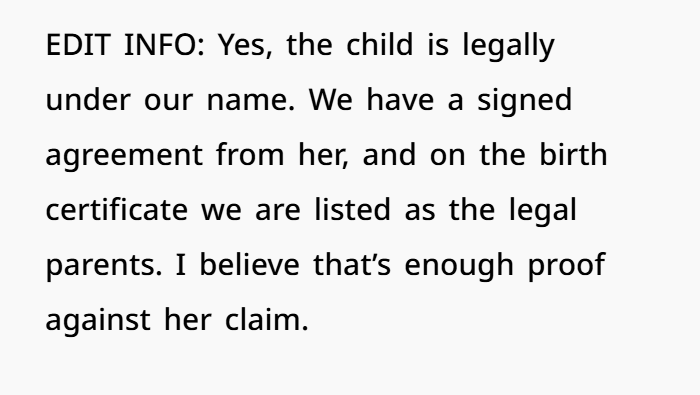
Let’s break down the situation from several angles: legal status, the best interests of the child, ethics, emotional consequences, what arguments each side might use, and possible outcomes.
Legal Context (Especially in Pakistan)
- First, in Pakistan, formal adoption (in the way Western countries may allow severing legal ties with biological parents and treating the adoptive parents fully as legal parents) is not recognized in exactly the same way. Instead, there is guardianship under the Guardians and Wards Act, 1890. ISLAW+2Pak Legal+2
- Under that Act, a person can be appointed as a guardian by the court. But guardianship doesn’t always carry all the same rights as “adoption” would in other legal systems, especially regarding inheritance, etc. ISLAW+2Pakistan Legal+2
- The child’s “welfare” (or “best interests”) is the touchstone. Courts decide custody, guardianship, etc., based largely on what is in the child’s best interest. That includes stability, bonds, the child’s welfare, etc. lira.bc.edu+2ISLAW+2
- Also, even if legal parentage is “under your last name” and there’s a signed agreement, that might help your case strongly, legal vs biological parent rights can be contested depending on what the agreement is, whether it was done under full legal oversight, whether proper court orders were sought, etc. The strength of your legal documentation matters.
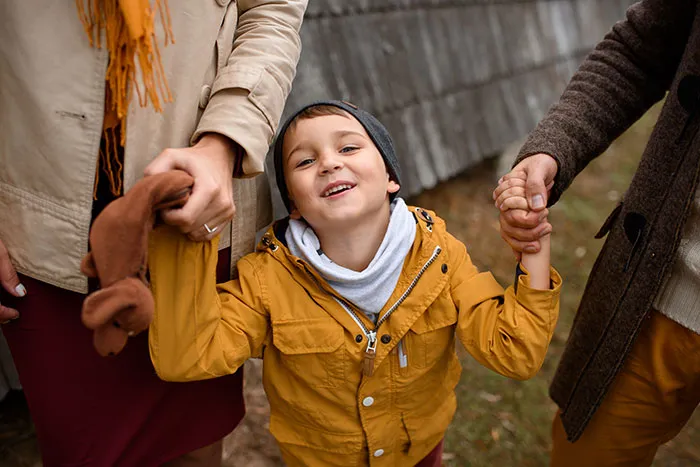
Ethical & Moral Considerations
- Best interests of the child: From what you describe, the child has lived with you from early age, been raised by you, sees you as real parents. Uprooting that and handing him over to someone who, despite being biological mother, didn’t act as primary caregiver might be highly disruptive emotionally and psychologically. Children benefit from stability, continuity of care, strong attachment. Breaking that can lead to trauma, confusion, sense of abandonment.
- Parental duty vs biological claim: Biological ties do carry emotional weight and may confer certain moral claims. But in many ethical frameworks, the role one actually plays (care, love, protection, daily presence) often weighs much more heavily when thinking what is fair.
- Promise, contract, trust: You and your sister presumably made an agreement—she asked you to take him in, you paid for everything, you registered him. There’s an implied promise/trust that this was permanent (or at least long‑term). To turn around now seems a betrayal of that trust from moral point of view.
- Impact on identity: The child identifies you as parents. Telling a child that you are no longer their parents or pushing them away from you would likely cause identity issues, confusion, grief. The question is: which arrangement preserves the child’s emotional identity and gives him stability?
- Fairness to all parties: Biological mother’s feelings do count. She does have an emotional bond, has rights. But especially because she relinquished financial and caregiving roles earlier, moral obligation would seem to lie more with her to accept the arrangement unless compelling reasons exist to change it.
Arguments Sister Might Make (and possible counterarguments)

| Sister’s possible arguments | Your counterarguments |
|---|---|
| “He is biologically mine; I have a right to raise him now that you have your own children.” | But biology alone isn’t enough if you haven’t exercised parental responsibility. The law tends to favor actual caregiving and established parent‑child bond. |
| “He belongs with his real mom; it’s unfair he doesn’t know me as his mum fully.” | But he does recognize you as parents; he has you as primary parental figures. Going back would be confusing. Also, you never prevented her from being in his life or visiting. |
| “I gave him away; I want him back now.” | But that act of giving implied acceptance of you raising him permanently. And you’ve acted as his parents at all levels — legal, emotional, financial. |
| “It’s my right as a biological parent.” | Rights are not absolute; courts often weigh what’s best for the child. If you’ve been his parent in all but biology, that holds weight. Also, your legal documents (agreement, registration) help your case. |
Psychological & Emotional Consequences
- For the child: losing the only “parents” he’s known, being forced to live with someone he never bonded with or saw less often. Risk of attachment trauma, feelings of loss, confusion, possibly anger or betrayal.
- For you and husband: emotional suffering of losing someone you loved, nurtured, parented. Also guilt or conflict either way.
- For sister: she may feel shame, regret, jealousy, but also may have been absent emotionally; might feel entitled now, but the change could be emotionally difficult for everyone.
- Broader family dynamics: trust may suffer; relationships may be strained.
What “Best Interests of the Child” Likely Implies
- Courts (in Pakistan under Guardians & Wards Act) would look at who has acted as caretaker, who the child has strongest attachment to, who’s provided stability, who can provide ongoing emotional and material care. ISLAW+2lira.bc.edu+2
- Also whether change would harm the child: emotional, psychological harm of displacement. The longer time has passed with current caretakers, the heavier that weight likely is.
- Because the child is 8 and has formed identity, preferences likely matter more than for a younger child. The child’s own wishes may be considered if deemed mature enough. lira.bc.edu+1
Possible Legal Outcome & What You Should Consider

- If you have proper legal guardianship (or adoptive parent recognition) and the birth certificate lists you as legal parent(s), your case is very strong.
- Even if sister sues for custody, you would probably be able to defend based on emotional/psychological best interests, stable home, continuous parenting, likely her relinquishment earlier.
- If no formal court order, but strong documentation and long period of raising the child, courts often favor continuity, because sudden change can hurt. But formal documentation helps a lot.
- Also inheritance issues: because Pakistan doesn’t fully recognize “adoption” in Western sense, there may be legal limitations (child may not inherit like biological child under certain laws) unless special measures are taken. Pakistan Legal+2Pak Legal+2
My Judgment: AITA?
Given all this, no, I don’t think you’re the asshole. From what you’ve shared:
- You took on full responsibility years ago.
- You raised the child with love and permanence.
- You have legal recognition under your name and a signed agreement.
- The sister has had the option to be involved, but didn’t much.
- Now, simply because you have another child, she expects to “take him back.” That seems unfair and potentially very harmful to the child.
So morally and legally, you have strong ground to refuse. It sounds like your relationship with him is parental in every meaningful way. Fighting to keep him seems justified — both for his welfare and for what seems fair to you.
If anything could change things, it’d be if:
- The sister can prove you abbreviated her rights in a legally meaningful way (maybe in contract/guardianship laws in your jurisdiction).
- The child expresses a strong wish (if mature enough) to live with his biological mother and courts consider that.
- There were issues in your home you’re not aware of that affect child welfare.
But the process wasn’t as easy, since he was legally the sister’s son now

